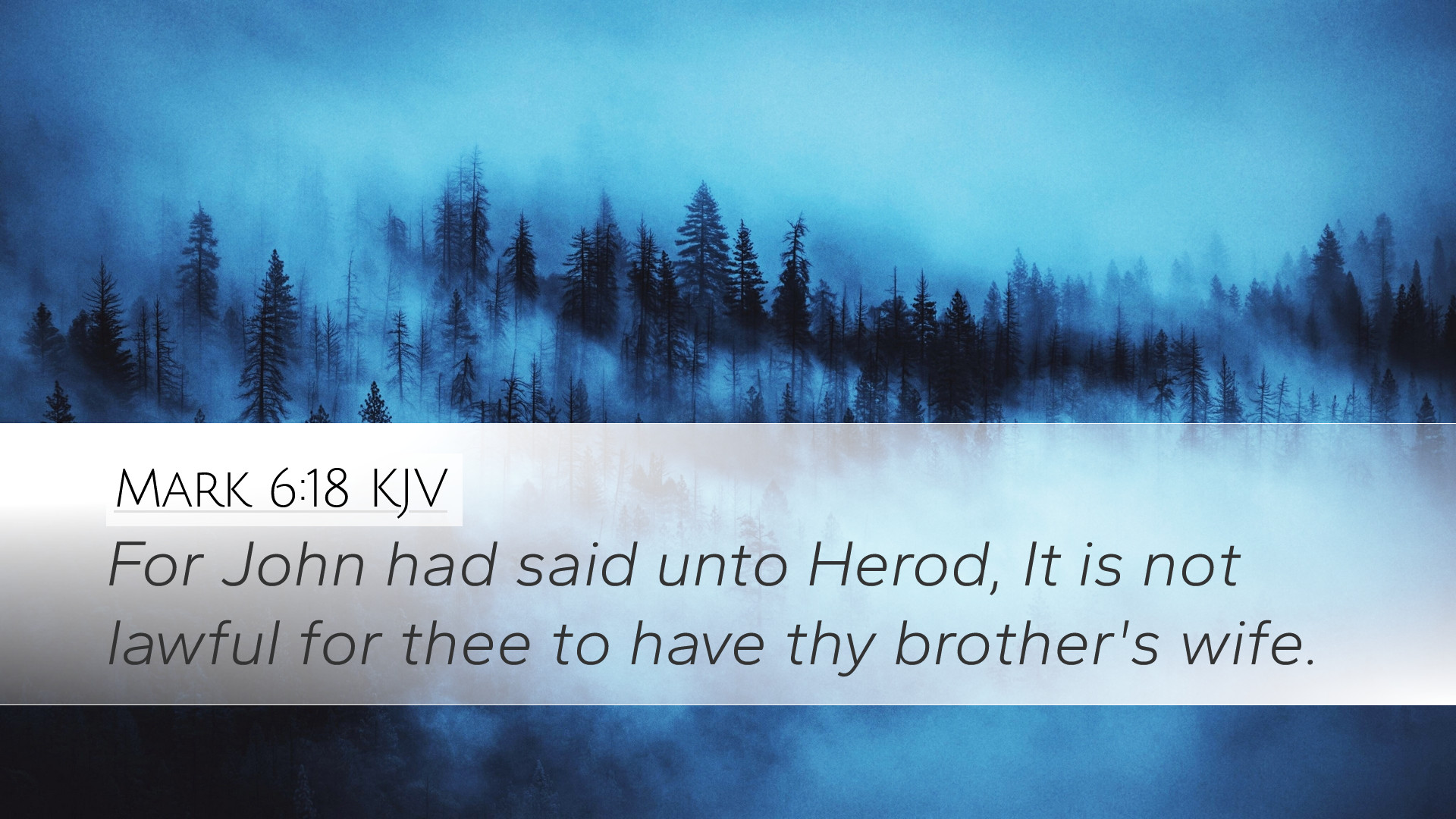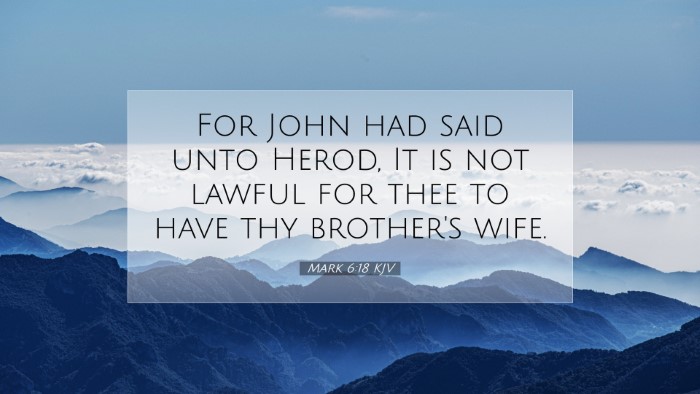Commentary on Mark 6:18
Bible Verse: "For John had said unto Herod, It is not lawful for thee to have thy brother's wife."
Introduction
This verse is situated within the narrative of John the Baptist’s imprisonment and serves as a critical moment that highlights the tension between righteous prophetic speech and the authority of secular leaders. Understanding the implications of John's message to Herod offers profound insights into issues of morality, authority, and the prophetic voice in society.
Contextual Background
In the context of Mark 6, the readers encounter a portrayal of Herod Antipas, the tetrarch of Galilee, who had married Herodias, the wife of his brother Philip. John’s condemnation of this union exemplifies his role as a prophet who speaks truth to power, drawing both admiration and animosity. It is crucial to recognize the cultural and historical background of Jewish law and morality to comprehend the weight of John's declaration.
John the Baptist's Prophetic Role
According to Matthew Henry, John the Baptist's role was not merely that of a preacher but a prophetic figure who boldly confronted immorality. His statement to Herod regarding the lawfulness of marriage underscores his commitment to divine standards over human authority. John did not shrink in fear of Herod’s power, but instead, he courageously declared God's truth.
John's Courage
Albert Barnes highlights John's fortitude in addressing the immoral behavior of those in high positions. This courage serves as an example for pastors and leaders today, urging them to stand firm against societal ills and injustices, even at great personal cost.
Morality versus Authority
Adam Clarke emphasizes the tension that arises when moral truth collides with political authority. Herod, representing the secular power, finds his actions judged by John’s prophetic voice. This clash should challenge contemporary believers and leaders to reflect on the necessary relationship between faith and civic responsibility.
The Lawfulness of Marriage
The crux of John's accusation centers around the Jewish laws concerning marriage. According to the Mosaic Law, a man marrying his brother's wife while the brother is still alive is considered unlawful (Leviticus 18:16). This prohibition reveals God’s design for marriage and family, which is vital for maintaining societal integrity.
- Divine Order: John's condemnation emphasizes the necessity of adhering to divine moral standards rather than conforming to cultural practices that deviate from God's laws.
- Witness to Truth: In confronting Herod, John exemplifies the prophetic call to uphold truth in uncomfortable situations.
Implications for Modern Believers
Matthew Henry notes that John's ministry serves as a vital reminder to present-day believers about the importance of speaking out against sin and advocating for righteousness. The ethical implications drawn from John's life challenge pastors and student theologians to engage with contemporary moral issues proactively.
Facing Persecution
John's imprisonment serves as a forewarning of the potential consequences when a believer stands firmly against societal sins. Albert Barnes reflects that true discipleship may require enduring hardships and persecution, as those who challenge established norms may provoke resistance. This speaks powerfully to those who feel led to address difficult topics in their ministries.
Prophetic Voice Today
In a culture increasingly resistant to moral absolutes, John's boldness is a beckoning for today's church to reclaim its prophetic voice. Adam Clarke asserts that the call to proclaim truth remains paramount, even when it places individuals at odds with prevailing societal norms or authority figures.
The Theological Reflection
Mark 6:18 illustrates a significant theological principle: the prophetic mandate calls for both courage and clarity of moral vision. John the Baptist serves as a model for confronting sin with grace and truth—a challenge that continues to resonate in today’s ecclesiastical dialogue.
- Authentic Discipleship: Recognizing that following Christ involves upholding His teachings, even when inconvenient.
- Call to Justice: Understanding that the prophetic voice often intersects with matters of justice and moral righteousness.
Conclusion
Mark 6:18 is more than a historical statement; it is a call to action for all believers. The legacy of John the Baptist not only echoes through the halls of faith history but also resonates in the contemporary world where moral ambiguity reigns. For pastors, students, and theologians, this verse must serve as a catalyst for deeper exploration into their roles as agents of truth, defenders of righteousness, and followers of Christ.


